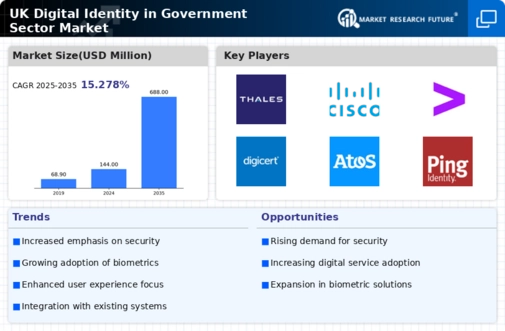Regulatory Compliance and Standards
Regulatory compliance plays a crucial role in shaping the digital identity-in-government-sector market. The UK government has implemented various regulations aimed at safeguarding personal data and ensuring secure identity verification processes. The introduction of the General Data Protection Regulation (GDPR) has heightened the focus on data protection, compelling government entities to adopt compliant digital identity solutions. This regulatory landscape is expected to drive the market as agencies seek to align their identity management systems with legal requirements. Furthermore, adherence to standards not only mitigates risks but also enhances public trust in digital services, which is essential for the sustained growth of the digital identity-in-government-sector market.
Growing Demand for Secure Digital Services
The digital identity-in-government-sector market is experiencing a notable increase in demand for secure digital services. Citizens are increasingly seeking efficient and secure ways to access government services online. This trend is driven by the need for convenience and the desire to minimize physical interactions. According to recent data, approximately 70% of UK citizens prefer online services for government interactions. This shift towards digital platforms necessitates robust identity verification solutions, thereby propelling the growth of the digital identity-in-government-sector market. As government agencies strive to enhance user experience while ensuring security, investments in advanced identity management systems are likely to rise, further stimulating market expansion.
Collaboration Between Public and Private Sectors
Collaboration between public and private sectors is emerging as a key driver in the digital identity-in-government-sector market. Partnerships with technology firms enable government agencies to leverage cutting-edge solutions and expertise in identity management. This synergy fosters innovation and accelerates the development of secure digital identity frameworks. The UK government has initiated several collaborative projects aimed at enhancing digital identity verification processes, which are expected to yield significant improvements in service delivery. Such collaborations not only enhance the capabilities of government systems but also contribute to the overall growth of the digital identity-in-government-sector market, as they facilitate the integration of advanced technologies.
Technological Advancements in Identity Verification
Technological advancements are significantly influencing the digital identity-in-government-sector market. Innovations such as artificial intelligence (AI) and machine learning are being integrated into identity verification processes, enhancing accuracy and efficiency. These technologies enable government agencies to analyze vast amounts of data quickly, improving the speed of identity checks. As a result, the market is likely to witness a surge in the adoption of AI-driven identity solutions. Moreover, the UK government has allocated substantial funding towards research and development in this area, indicating a commitment to modernizing identity verification systems. This focus on technology is expected to propel the digital identity-in-government-sector market forward.
Public Awareness and Trust in Digital Identity Solutions
Public awareness regarding the importance of digital identity solutions is on the rise, positively impacting the digital identity-in-government-sector market. As citizens become more informed about the benefits of secure digital identities, their willingness to adopt these solutions increases. Trust is a critical factor; therefore, government initiatives aimed at educating the public about the security measures in place are essential. Surveys indicate that over 60% of UK citizens express concerns about identity theft, which underscores the need for reliable digital identity systems. Consequently, as trust in these solutions grows, the digital identity-in-government-sector market is likely to expand, driven by increased user adoption.

















Leave a Comment